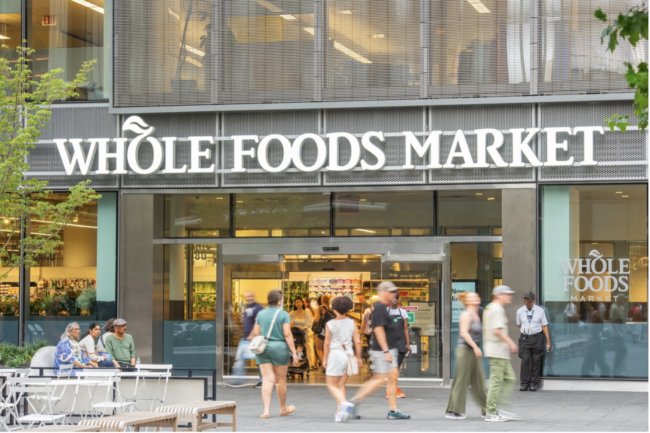In the area where I live, there are a lot of places to eat from a distance: a pizza place across the street, a 7th Street Burger, a coffee shop and two separate cookie places (including Crumbl, of course). But bridging the gap between all of these places has been a supermarket called Whole Foods, which, for the past 24 years, has sold food to the community in my neighborhood. Whole Foods started as a “mom-and-pop shop” with a mission “to nourish people and the planet.” It was seen as revolutionary–and as my neighbor John put it, provided people “with a sense of excitement.” I would also experience this excitement when my family shopped at Whole Foods. But everything changed on one fateful day in the summer of 2017, when Whole Foods was acquired by the e-commerce giant Amazon–triggering its recent and painful downfall.
One reason people go back to supermarkets is to find the products they love while gradually discovering new things that they might come to love. This, somehow, is the number one thing that Whole Foods now fails to do. For example, on early Sunday afternoons, when I go with my family to shop for the week, Whole Foods is already out of eggs, the bakery is empty yet there is a puzzling surplus of frozen chicken nuggets and butter. Before 2017, Whole Foods would also periodically have stands with samples for new produce/proteins they were selling–which has disappeared now. This disappearance is further reflected in the fact that Whole Foods rarely has the same food for more than two days in a row.
The giant reduction and constant change of the products carried in Whole Foods presents a big inconvenience and, honestly, a big turnoff for customers. For example, Whole Foods used to carry brands like Bumble Bee canned tuna, Weight Watchers’ frozen desserts and Amy’s Kitchen frozen cooked meals. One out of these three brands remains–and while they still carry Amy’s Kitchen, it is almost always out of stock. These beloved brands have been replaced by Whole Foods’ house-made products, which frequently are mediocre and, again, always out of stock.
This is also true for the produce department, which in the past year has not stocked lettuce, pomegranates–even periodically running out of lemons, limes and various root vegetables. But this is contradictory to the products they hold. It raises questions: why can you not buy a head of lettuce, yet a bag of pre-chopped salad with other vegetables is available? Why are there substitutes for foods that should be considered basic in supermarkets? Maybe these decisions make for less work at a possibly lower price–but it’s not why people have come to Whole Foods for all of these years. Noticing their mismanagement of pure products also comes with the carelessness of the little but telling details–like misspelling ingredients like “pummelo” when it’s spelled “pomelo” and “Rosset potato” when it’s spelled like “Russet potato.” And though these are minor things, they overall contribute to Whole Foods’ new lack of care–and the everyday person’s knowledge of food.
The downfall of Whole Foods raises questions about Jeff Bezos, chairman of Amazon’s fascination with buying small businesses once they reach a “threatening” status. This goes not only for Whole Foods but for companies like Ring Doorbell and the “Washington Post,” which were reportedly bought by Bezos to “complement and amplify other regions of Amazonia.” While there is nothing fundamentally wrong with Bezos’ acquisitions, there have been questionable moments where an abuse of power is suggested. For example, this past year, the Washington Post was one of the only big news corporations not to endorse a presidential candidate in the 2024 election–and Ring Doorbell was recently involved in a few different class action lawsuits for non-consensually submitting footage to police departments.
In essence, this history suggests that Bezos is buying companies that he personally believes Amazon is challenged by–only to show little to no interest in the products/actions that they were once loved for. Why should we everyday people be subjected to one man’s fear of competition? Why can people not get the products they desire and need for their families–especially those living in food deserts? In the end, the plunge of Whole Foods didn’t need to happen. It certainly wasn’t on its way to that in 2017–but we can only hope that one day, someone can turn it into the “exciting, nourishing” store that it always set out to be–and unfortunately, no longer is.







Their prices have also increased and at the same time product availability and quality continue to decrease..
Thank you for writing this inforrmative piece. I have also noted the decline in the nutritiional food products. They began selling farm raised raised fish, local farmer produce is limited and the brand changes. No longer can you just pick up a box of crackers and feel confident that they are nutritious and safe After the recent band on red dye in food, beverages and medicine, I thought this was handled thirty years ago but consessions were made and it was only banned in cosmetics. Shame on me believing the FDA has us covered Before the recent bad we only had 11 banned chemicals as compared to EU that had 1300.
Hello
I have been an employee at Wholefoods for over 4 years. In my area, there are ten other stores that sell food in a five-mile stretch of highway
Competition is definitely a consideration. Wholefoods has a reputation for being pricey.
However, the 365 brand is comparable to other store brands for quality & price.
Wholefoods is very customer & employee focused. Complaints to Customer Service and/or
Store Leadership are taken seriously. I have never seen spelling errors in my store.
Eggs are in shortage at all stores not just Wholefoods because of condition beyond their
Control. Our produce is the best I have seen in the area.
If some products have been removed, it hey probably no longer meet Wholefoods standards.
Amazon does bring in a lot of traffic in the store for their pickup/return counter.
It sounds like there is a problem with the store in your area. Before condemning the entire company, you may want to do more investigating.
You should also contact corporate directly about the issues in your store.
Great and truthful article, about a once cutting edge grocery store, that now under the direction of Amazon has certainly gone down hill. I worked there for a year back in 2016 and already could see the stores downhill writing on the wall. TY and good blessings your way!
This is sad, but true. As someone who worked for WFM, the sale in 2017 saved the company from falling into the hands of a capital management group. Had that happened WFM could have eventually been sold off to smaller growing companies, like Sprouts, Lucky’s Market, The Fresh Market, HEB. Those grocers did and some do still have a real connection in their communities and are not the soulless shell of a grocer that Amazon has created. Stop shopping there – find a better place to experience food.
I’ve noticed this trend, and I’ve wondered why. I shopped at Whole Foods Market from the time it arrived in Kansas City, and saw the shift from herbal loose teas and supplements, to discontinuing those types of products, for the most part. There’s been a complete metamorphosis of the brand, and I don’t recognize it any more. I love what it once represented, but I’m not jazzed the way I once was. It doesn’t cater to the natural food and supplements lover in me as it once did, and seems to be more about how much money they can make, how fast.
I was in Whole Foods today in an attempt to have lunch. There are food selections have gone way down as far as healthy vegetarian or vegan selections. They used to make a lot of different vegan cookies and baked goods. No more. The lady at the coffee stand was gone more than she was there. They had no decaf they were out of their breakfast blend. It’s just poorly managed and stopped. I hate to see this.
I totally agree. My go to snack has always been popcorn. I used to frequent the Whole Foods in Pasadena, California to purchase White Cat Corn which in So Cal was only found at WF. After the Amazon purchase it disappeared from shelves. I stoped shopping at Whole Foods
My Whole Foods hasn’t changed at all. It still stocks most of the things we always buy, the produce is fully stocked, and there are lots of samples offered. It could be that your location is the issue, or perhaps management. Contact WF via their website to find out what could be causing the issues.
You are spot o! Thanks for voicing it. The question is, and it’s rhetorical, Is Jeff Bezos listening.
I live in Austin TX where Whole Foods began. I used to love to go in there, all of the associates were knowledgeable about their products n it had a warm n welcoming atmosphere but no more. I don’t go in there anymore but then again Austin has changed as cities will,not necessarily for the better.
I too have gone to Whole Foods since it first opened. In Lis Angeles.I live in Indianapolis now, and they have taken away products like Unsweetened Oat Milk creamer that I use in my coffee.
The hot food bar in every Whole Foods that I have visited (except for Rockville, MD) are disgusting and have the same disgusting food.
When I went home to Los Angeles last fall, I couldn’t wait to go to the store in Venice, CA to go to the hot bar…. It was the same crap as in Indiana.
To my surprise, they do sell the unsweetened oat milk creamer at the Whole Foods in Savannah, GA, but the food bar is disgusting.
I have found other local stores in Indiana and Los Angeles and will no longer shop at Whole Foods.
Quit working there for this very reason. Workplace culture died with the acquisition. Company went down fast after the Amazon purchase and what made it unique was no longer there.
Whole Food is out of any questions the best supermarket and only one I can trust!
I don’t care about misspelling nor out of stock items there are many other options to choose. Quality is the key.
I guess it depends on the area/location of your WF store. I have not experienced any of tge issues above in the stores in my area (NYC)
Sad but true. I used to go to Whole Foods on my way home from the senior center and pick up a few treats for myself. The deli became hit and miss, meaning some days itwas good some days it was bad. And the self serve buffet section became a joke And looked like week old, leftover food. and I used to absolutely love the all butter croissants from the bakery, but they stopped baking them with pure butter. And of course, the day I bought unbelievably spoiled chicken really turned me off from that store. And we don’t have to talk about the cost because everyone knows it’s expensive
I agree. I used to love going to Whole Foods Market because I trusted there products being organic but no longer since Amazon took over and they just sell crap right now and I have not returned in a year it’s been a whole year since I’ve returned and I’m not planning on returning cuz Amazon ruined Whole Foods Market. It is no longer a natural and organic Whole Food it’s nothing but crap and I refuse to return.
Yes I agree that whole foods is changed. BEING a team member for 13 years and a shooter. Its become totally different atmosphere. Food quality lacks , knowledge of food is not knowledge to customers. Availability of products slack, cleanliness is not up to standards, equipment stays broken for a longer than usual time before it’s repaired or replaced. Team members are squeezed to the max wirh work overload. In general not many smiles or satisfying and delighted customers. Customer several has gone done. I almost always her the complaints of our loyal customers and noticed that I have not seen lots of them in a couple of years. Wonder why?
Same here in Miami. It once was a store with a feeling of being outside the norm, where hip people, with disposable income, yes, shopped for those items that could not be found elsewhere, that would pay extra for quality products. Now there is hardly any organic produce and the feeling of a well-run and special store is gone. I am a frequent buyer of Amazon since the pandemic, and not at all before, and I appreciate the convenience of same day or overnight home delivery, and the ease of returning at an UPS store with no lines with my arthritic feet—I’ve spent an hour shopping at stores, only to leave without purchases when I see a slow-moving line of 10 people shuffling and waiting for two cashiers—but I also carry guilt for my further lining the pockets of a questionable billionaire while I dispose of a another box much larger than needed for the speciality toothpaste that I tapped on my phone for yesterday.
I wholeheartedly agree with this article, the vegetables and fruits are not fresh, onions are old as dirt and it still sits around for someone to buy, WHOLEFOODS has gone done hill.
I agree with you. We don’t even have a real Whole Foods in my neighborhood, it’s a 365 store with no fresh butcher, or bakery. They just bring it in like a regular grocery store.
agree with you. We don’t even have a real Whole Foods in my neighborhood, it’s a 365 store with no fresh butcher, or bakery. They just bring it in like a regular grocery store.
Spot on ! I used to be able to go into whole foods in my community and grab a quick bite off the salad bar. Now everything is greasy fatty and definitely not whole. I do miss it!
This pretty much says it all..
A company should have a mission but Amazon’s seems to be to take over all the retail and drive everyone else out of business. That’s not a mission worth pursuing. I won’t shop at Amazon.
You’re definitely going to the wrong store, they sound like they’re not following new ordering procedures which is a company wide issue.
Signs are made in store so maybe gift them a dictionary lol.
But as for product range that is an issue I’ve been fighting where I can, we used to source new items at regional level, now it’s all done from Austin TX based buyers, so we drop more and more local items, some I’ve managed to return but it’s a problem.
I cannot agree more. In this Era of the Wild West where food is concerned, you felt that WHOLE FOODS was a bastion of hope. Now, when you leave there, the general feeling is that you have just been taken. You feel like choice is absent. If you do not have a Prime membership you pay more. The experience is almost painful. Your pocket book is much lighter but you satisfaction quotient is much lower.
You are so correct. I am 77 years old and have shopped at whole foods for 40 years and now it is nothing like whole foods operations were for so many years
At one time you shopped at Whole Foods and always trusted what they offered. Now you have to read the ingredients because they have so much junk pretending to be “health foods” . While better than most grocery stores, it is no longer even good. Instead. It just “ok”.and getting worse with each passing year.
Whole Foods, since Bezos took over, is just a shell of itself. Except for the Bakery, the rest of the store is stocked with also ran products. It has lost that aura identity
Not the Whole Foods I once knew and adored.
I used to be in Whole Foods two or three times a week seeing what looked good and what might be on sale as relief for their high prices. I go there two or three times a year now If I want something specific that the area supermarkets won’t have. Most recently was to get a bottle of Japanese plum vinegar but they no longer carry that. I used to go there almost weekly for quarts of organic valley half and half. Then for months, probably 3/4 of a year, they didn’t have any except the lactose free which apparently didn’t sell because the rack was always full of it. I got tired of asking the staff to see if it was any outback because there never was. I contacted organic valley to find out what the deal was and they said they certainly didn’t know, that the product was available, and gave me some other markets I could perhaps buy it in. The next was when they got rid of the bioclean green detergent in the gallon bottle. That was a bargain at the number of loads you could get out of this concentrate, although still quite expensive. It started carrying small bottles of it at a much higher per load price. Then they started substituting others. Not sure if they still carry it now. Whole Foods prices have always been super high but the quality matched. I’d go in there frequently just to see what they had that was on sale or that looked particularly good and I’d make purchases pretty much every time I stopped, probably two or three times a week. It was pretty much the only supermarket we used. Now I only go there on rare occasions, often as an errand for someone else, not me.
I don’t experience this same thing at my Whole Foods. I love it. Some things they don’t carry or discontinue because of ingredients or not sustainable in production or not environmental conscious….Maybe in your area they’re just trying to keep up with things that sell more. That’s on the shoppers…not the store. Maybe leave a note in their suggestion box.
Whole Foods market has indeed lost its soul.It used to feel like family,but now it like any other grocery store . The products are substandard now,no warm welcoming feeling.Everything is 365. Which is substandard.Employees as a whole are not as friendly. I think. Because of Amazon take over
Whole Foods has some of the oddest products I went to get smoked Gouda cheese and they only had the same awful ones every other supermarket had. No dutch smoked Gouda. The labels on everything were way too small to see from a standing position. Their. Premade dinners looked like frozen food defrosted. Not appetizing. No help at the bakery. Fish prices very high and are they fresh enough?
I thought you were going to write an article about how Whole Foods had lost its character and flavor and personality once Whole Foods went on the stock market that was basically the end of Whole Foods and when Amazon bought it they started to cut things out of it like we used to sit around the bar and a chef would make a meal for us things like that and they quit doing that I was there when Whole Foods Market opened its doors some of the employees thought that that was so cool when I told him I used to have a friend named Jimmy that went around the store on roller skates he was deaf this was in Austin Texas when Whole Foods first opened their doors they had one of a kind items you couldn’t find anywhere all handmade Cosmetics things like that which everything is mass marketed now once it went on the stock market you know things that you can find anywhere online that’s the article I thought you were going to write about Whole Foods how that you started out right saying it was mom and pop store that’s correct and then once it went on the stock market it lost its personality and became a mass marketing store like any other store yeah it’s really sad the only thing I can think of is they do have the handmade soaps and where you can cut soaps and make your own soap and stuff like that that’s about it that’s about the only thing I could think of that is really left that they started with in the very beginning when they open their doors other than that it’s like any other grocery store now has nothing to do with a supply chain it has to do with the lack of handmade products and the personality of the store it was crazy back then so cool it was one of a kind trust me!
I have no complaints about the whole foods in my neighborhood. The cafe is a regular gathering place for some. They have an over abundance of fresh fruit, vegetables, cheeses, seafood and meats with someone always replenishing the aisles. I also enjoy the selection of fresh flowers. The only complaint I’d have would be the prices.
I stop shopping amazon when I realize that it’s competitive marketing platform was one of the reasons. Several of the stores I grew fun no longer have store fronts. To be in partner with these stores was wise.
Amazon Whole Foods purchased, years ago, a food chain in Massachusetts called Bread & Circus. That store was a gem. Unique well made products. Excellent local produce. It was a great place to hang out or visit often. The death toll was when Bezos took over. Quality and variety have gone down. Other stores are trying to fill in here such as Mom’s Organic and Fresh Market. Money doesn’t make everything better.
So true ! A pity that Whole Foods has become what it is now.
Their fruit and veggies used to always be ripe and delicious. Now, they have no taste. Whole Foods would use local farmers as much as possible to have the fresh fruit and veggies. Now they operate just like any national grocery store, they’re just more expensive.
I work at whole foods and I worked for Walmart previously. It is sad how great things are no longer because of big corporations that swallow everything. All the clothes look the same, there are fewer options, fewer ideas, nothing is unique or stands out because a few own and run everything so only a few ideas. At work they keep making changes and implementing new things and it’s all about inventory and programs for keeping track of it and controlling it and making sure scans are done. Less and less about the food. The supplier for us UNFI is also poor at buisness.
Ii completely agree with Amazon being to downfall of Whole Foods . I was a Whole Food shopper for about 10 years previously to it being incorporated by Amazon. Now when I go there it is only when I have looked everywhere else and I can not find it anywhere else . When it use to be my first go to when I went food shopping. Now it is a last resort place . They were my hero , now they are almost a zero !!!!
FIVE THINGS TO BUY AT WHOLE FOODS
1. eggs
2. trader joes ravioli
3. dried moose flakes
4. elk
This maybe a local store problem. The WFM I patronize still can be counted on to have a consistent supply of the best produce around, lots of organic food, and special items for people with food allergies. Their sandwich bar and hot food line is excellent. I have noticed, however that WFM in nearby towns do not have the same variety of products. This says to me that it is not necessarily a problem of cooperate direction as to contents but maybe a corporate profit requirement so that stores in certain areas have learned by trial and error that a particular product lineup yields higher profits.
Awful decline in all standards. I strongly believe my local Lynnwood WA store is a goner.
I don’t see why anyone would shop Whole Foods. Though their website offers name brand, I can’t find any in there stores. Everything I see is Organic or Amazon brands.., from candy to potato chips to cookies, and vegetables. The few items I purchased in the store tasted very bad. This includes a soda, bag of chips and a candy bar. Still there is a constant in and out of the store. The stores are almost full every time I visit. The most surprising thing to me is the customers are split 50- 50 black and white. What surprised me most is Whole Foods is very expensive to me. Honestly I didn’t expect that many blacks shopping There. In my opinion the economic bracket seems equal, with half of the black Customers at the bottom of the economic bracket . Go figure.
Thank you for this affirmation of what I experienced at Whole Foods after a hiatus of many years. I couldn’t find anything that. I used to shop at Whole foods for. Very uninteresting, and dissapointing.
I worked at Whole Foods and we would run out and to prepare food department and have to go to produce and transfer goods. The selection was far in between low rated almost like shopping at Save-A-Lot.
The prepare Foods Department that I work for was always running out of things peppers onions root vegetables you name it herbs we always were out it was very frustrating and tactful to work there
I agree. It is sad.
Concentration of wealth – bad. It’s so simple and damnit, it feels so hopeless
Sorry for the negativity.
Liz
Personally as someone who would occasionally shop at Whole Foods but also worked creating consumer awareness by sampling and educating consumers on products I noticed a tremendous change on the amount of work I use to get offered before and after it was bought out. As for its soul being ruined after its acquisition, well yes I agree. It is now more corporate and less about the people. The service at some of the stores I’ve gone to is not the same, the products I use to enjoy are no longer available and to be honest I rarely feel the welcoming feeling that I normally get at other gricery stores.
This story reflects a symptom of what this country has become.
So true I must say I started working with Wholefoods in 1998 Walter Robb was the Ceo and he was an amazing leader and a caring human being. We were like family but when the leaders all got bought out things changed and bezos let wholefoods hire a bunch of unqualified cut throat leaders that no longer appreciated hard work and this is where things got bad. These new leaders were able to target the great workers sadly I was there 23 years and became a casualty and unjustly terminated . It’s the people connection that keeps customers and in stock conditions but no one has eggs right now. It’s sad what’s happen to the mom and pop markets it’s become all about $$ so I help another store make $$ but That was one of my favorite jobs and I’ve only had 3 my whole life I’d hoped to retire with Wholefoods but loyalty meant nothing to the new generation of leaders. Loyalty and integrity is huge in my book
Thank you for the article
Worked for them for seven years and multiple locations up and down California. Each year got more tedious and unmanageable. Everything you said is correct in one way, but on the back end… ‘JODER’ it’s so much worse than you think.
My brother, John Mackey, founded Whole Foods with 2 friends in 1980. I’m not sure I would call it a “mom and pop” shop. More a hippie grocery in Austin, TX. FYI
I agree. Whole Foods has become and overpriced supermarket. I worked for Bread & Cirhcus and then Whole Foods when the chain cared about their product and their people.
Could not agree more. Even further degradation in quality since the pandemic. Their prepared deli section is not what it was. Rarely go there now. Used to be a regular customer. Maybe Trump could get Musk to look into what has happen4d here?
There are numerous problems indeed.
*Employees are cruel in general, leave boxes everywhere, some are downright mean.
*Paranoid security people accusing people shoplifting when there’s 0 on camera of theft.
*Food/salad bar in many stores, depending on store has gone way down in quality. Saucy, ‘poor people’ food available, too much unhealthy crap. Years ago it was phenomenal.
*The hires have been a serious problem. If you lnow what I mean, you know what I’m discussing here.
*Poorly skilled hires. If you call corp re a failure employee and you are correct 10000000%, they refuse to side with you.
Specific example—store in Jersey City—- there is a short fat blonde girl who is so off the rocker and mentally incapacitated and does not behave like an adult. She harasses disabled people, I’ve seen her chase people who mind their business and don’t do anything wrong, she looks for a fight, her language skills are poor and reactive manner in talking are inappropriate. This is misconduct at its worst.
*She blurts out falsehoods abouts WF policies. She walks up to random people accusing them of theft when there is no evidence.
*WF has a policy of paranoid accusatory attitudes and behaviors.
*No other stores behave this way.
Quantities of everything cut back.
* Poor stocking of merchandise, no quantity.
I’ve worked for Whole Foods Market for 27 years. It was Bread & Circus, Whole Foods Market at the time when I started in 1998. Whole Food’s had already bought the small chain in the New England area, but keep the Bread & Circus name. Needless to say, I’ve seen a huge change as the company has evolved. I’d say the article above has some validity to it, but most of it has not been my experience.
Are there products that are out of stock for weeks at a time? Yes, but most of that has to do with the vendor, not because WFM isn’t ordering it everyday.
Do they discontinue items that I’ve loved? Yes, unfortunately.
Do they only carry a product for 2 days at a time and then discontinue it? No. Never. If the product isn’t available, it’s a distribution issue, not that WFM only carries it for a few days.
The quality of the employees and how stocked your produce department and shelves are, directly reflects the Leaders in the store, and it starts from the top! If the Store Team Leader has low expectations and doesn’t hold their team members accountable, then yes… you might agree with the article. I’ve been fortunate to have worked in 6 stores, 3 in New England and 3 in Chicago, and they have all had amazing Leaders with very high expectations. To be fair, all of these Leaders are ‘old school’ WFM employees and have been with the company 20+ years. That’s being said, they’ve kept the culture alive in the stores and truly care about their team members, which in turn, makes the team members care about the work they do.
Have they hired Leaders that don’t truly understand the WFM culture? Sure, and that’s where you can begin to see a potential decline. As someone who does the hiring for one of the departments, it has been incredibly difficult to hire Team Members in general, let alone ones with good work ethic! Gone are the days where you had to leave your house to work. You can make millions being an influencer these days. The work ethic of the younger generation is different from the ones of people born before 1990. This directly affects the quality of your store. Whether you agree or not, it has a direct impact on it.
Amazon bought WFM to help save them from going under. John Mackey started this company in 1980, wanting to get good food to people. Never did he envision 500+ stores. They spent their money frivolously, and they could, because they were the only ones doing what they were doing 20-40 years ago (giving the options of natural and organic foods)!! There was no competition! Now WFM is competing with Target, Walmart, Costco, BJs, Wegmans and so many more. Of course the company is going to change, it needs to keep up with its much larger competition. And Amazon was the way to do it! Have I seen a shift in some of the ingredients since Amazon bought them? Yes, unfortunately I’ve started to see more seed oils being used.
Have they expanded the amount of items in house brand 365 items? Yes, significantly, giving more affordable options.
Have they lowered prices in some areas? Yes.
Have other items gone up in price? Yes.
This is the reality of business!! They still hold strict standards for the ingredients that are allowed on their shelves. Never will any of the products have: artificial flavoring, artificial coloring, no high fructose corn syrup, everything is labeled GMO or non-GMO, there are no growth hormones in any of their meats or seafood and the list goes on….
People shop at WFM for the customer service, the quality, and the reassurance that you aren’t putting absolute crap in your body. That doesn’t mean there aren’t things that are bad for you on the shelf, they are just made with ‘better’ ingredients than those items you’ll find at a conventional grocery store.
All that being said, yes, WFM has changed, but if your experience is similar to what the article is saying, it sounds like you should find a different WFM to shop at. Or, if the hot bar looks unappetizing, stop by the customer service desk and ask to speak to the Store Leader and give them your feedback. Because even though they have ‘changed’ with the times, they are still providing their communities with some of the best products available.